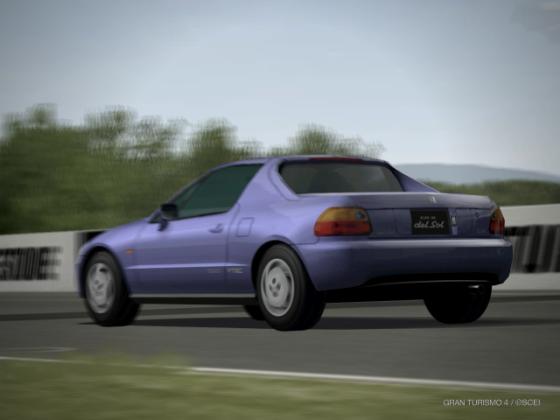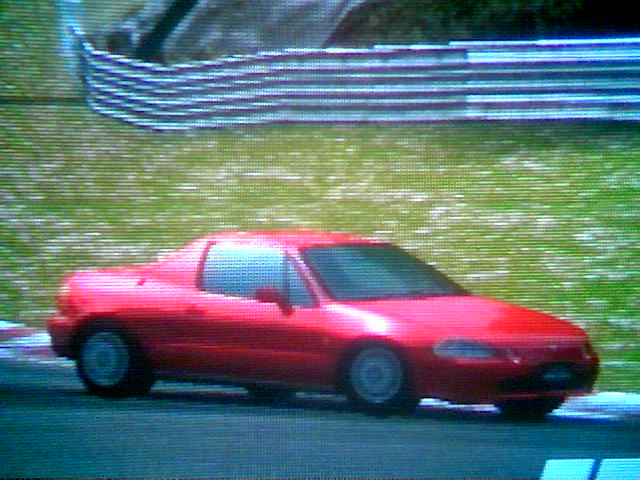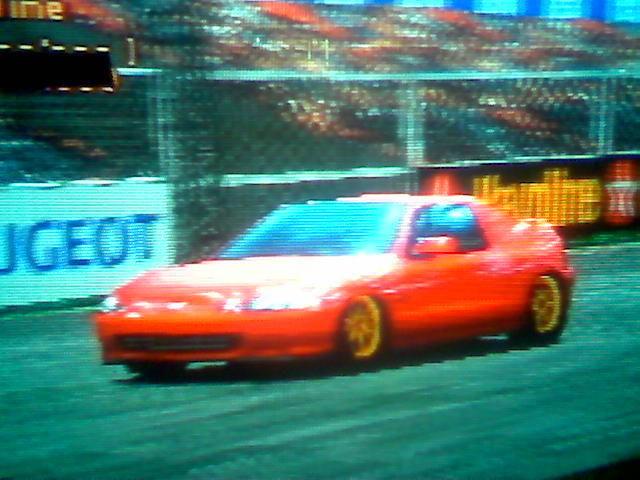|
Years Represented: 1992-1995
Class: Sport Compact
Type: Targa
Country: Japan ````````````````````````````````````````` Host: GT1, 2, 3, 4 & 5
Price as Tested: $8,160 ('93 del Sol S in GT1) // $7,920 ('93 del Sol Si in GT1)
$8,138 ('93 Si in GT2)
$12,159 ('92 SiR in GT5)
Body Construction: unit steel
Length: 157" // Width: 66.7" // Height: 49.4"
Wheelbase: 93.3"
Overhang: 5'4"
Track: 58.1" [F] 57.7" [R]
Weight:
2,254 lbs. (GT2), 2,425 (GT5)
Ground Clearance: 5.5"
Tires: 195/55-15
Brakes: vented discs / solid discs
Suspension:
double wishbones / coils / anti-roll bars
Layout: Front Engine / Front Drive
The car in GT5 had oil change but
no engine rebuild
Engine: 1.6 liter DOHC inline-4
GT2
GT5
Tested BHP: 165 @ 7,700 rpm
163 @ 8,000
Tstd Torque: 115 @ 7,000 rpm 113 @ 7,000
Lbs. per HP: 13.66
14.88
HP per Liter: 103.5
102.1
Credits per HP: $49.32 $74.75
Aspiration: normal
Valves per Cyl: 4
Compression: 10.4:1
Bore x Stroke: 3.18 x 3.09"
GT1 Idle: 500 //
Redline: 7,500 // RPM Limit: 8,000
GT2 Redline: 8,000 // Rev Limit: 9,000
GT5 Idle: 800 // Redline: 8,000 // RPM
Limit: 8,500
Transmission: 5-speed automatic (GT2) 5-speed manual (GT1 & GT5) \ GT1 testing results were made with
a del Sol Si, not the weaker S version.
GT1
GT2
GT5
0-60 mph: 8.866 seconds 8.7 seconds
9.390
0-100mph: 18.233 seconds 22.2 seconds
21.758
400 M: 16.722 @ 94 mph 16.514 @ 87 mph
17.269 @ 88 mph
1 KM: 28.555 @ 124 mph 29.838 @ 114 mph 30.169
@ 116 mph
Test Track: NA (GT1) 1:52.416
(GT2) 1:02.716 (GT5/Daytona) GT1 Top Speed: 156 mph @ 8,000 rpm
Top Speed at Redline (GT2)
1st: 38 mph
2nd: 59 mph
3rd: 85 mph
4th: 113 mph
5th: 156.64 mph
(8,600 rpms)
Top Speed at Redline (GT5)
1st: 38.2 mph
2nd: 60.6
3rd: 82.8
4th: 109.8
5th: 150.1 mph
@ 8,250 rpm
-----------------------EXTERIOR------------------------
Hey. Want a great-handling car while saving some bucks? Look no further than
the Honda dealership! If YOU have a job, a checking account, and have been cleared of all felony charges, the plaid-wearing
salesguy is ready to strike a deal for NO MONEY DOWN and NO CREDIT CHECK. Let's step inside.
Here we have one of the underdogs of Gran Turismo. Let's face it, the del Sol is not always chosen
over its famous cousin, the Civic hatchback. This is true in the game or in real-life. Not that the del Sol is a
bad car..in some ways it is slightly superior to the Civic. The del Sol is also known as the "Civic del Sol", since
it is based on the Civic platform. Sometimes, it is also called the "CR-X del Sol", and sometimes, the "Civic CR-X del
Sol". Confusing. Whatever we call it, the Honda del Sol went on sale to replace the CR-X in 1992, although neither
car made great sales. In America, just 75,000 del Sols were sold from 1993 till its death in 1998.
There are several models in our games. GT1 and GT2 both have S and Si sub-models, while
GT2 adds the '95 SiR, Mugen Pro. III and a VGi version. The S is the economy car, absolutely
great for beginners. It includes a Driver-friendly 1.5 liter engine and 13" steel wheels, while
the Si has a slightly larger 1.6 and 14" alloys, which are lighter than the S's steel. The VGi could only be bought in
Japan, and is apparently not any better than the S, power-wise; in real-life both sub-models started with 128 hp. The
VGi could only be had with a 4-speed automatic (according to CarsFromJapan.com) and I have been unable to learn what "VGi"
stands for, so far. Not that I researched very hard. There's also the Si and
the supposedly top-line SiR. These eventually can make about the same power in GT2 (245-ish
hp), but since the SiR winds up weighing about 120 pounds more with full upgrades, the Si winds up being the
best buy. Finally, GT2 also includes a fantasy car: the highly-sought Honda del Sol LM, which appears
in GT1 and 2, but doesn't appear in later games.
In GT3, 4, and 5, PD scaled way back, and no longer offers as many del Sols. Now we have the
'92 Honda del Sol SiR, which features a VTEC engine, and that's it. It is the top-line version, the King of the
del Sols, so perhaps PD and/or Honda didn't feel the need to offer anything less.
Any del Sol in any game boasts lines that are vaguely Italian, yet definitely still Japanese.
A pure Italian design would have something weird about it, after all, and though the del Sol is not 'weird', it is also not
ordinary. Body overhangs are minimal, the shape is jelly-beany-cute rather than threatening or intimidating. This
is a chick car, big time. Despite this, the del Sol is not bad in the handling department. Not to get ahead of myself,
but del Sols are all about hugging the road. We've got a lot of lateral stability here, while cornering. Recently I
got behind the wheel of an LM edition, which is an entirely different ballgame -- like comparing a bicycle to a spaceship,
yet even the LM shares the civilian car's habit of road-gripping.
As far as front-drive sports cars go, the del Sol is one of the easiest to drive, making it optimum
for a beginner. Really, any low-powered Hondas will do for an absolute beginner, but the del Sol is only 49" tall,
and maneuvers a little better than a Civic hatchback since it doesn't lean as much thru corners in some games, and offers
some extra stability over bumps, due to some extra weight the hatch does not usually have. Even
if somebody has never driven a single videogame car ever in his/her life, chances are that person could eventually handle
a del Sol, which makes the chances of learning more demanding cars later on both desireable and also familiar...after
all, what was your first car in real-life? Chances are it was some cheap hand-me-down, right? You didn't just jump
into an intimidating turbo-driven death machine, did you? ... So rests my case that this Honda (among several other front-drive
econocars) is perfect for n00bs in Gran Turismo. Probably the best.
For the experienced driver, the del Sol can be fun to drive amongst other under-powered autos on days when
you don't feel like tearing around courses at breakneck speeds. Its small size and drama-free handling can be a
plus when trying to squeeze thru a group of sim cars as the road twists and turns.
Like the CR-X, the del Sol was in production for just a few short years. It looks tasteful and distinctive
(the del Sol does), can be bought used or new quite affordably (depends which game you have: GT3 hasn't got a used car lot,
while GT4 & 5 feature only used del Sols). Even in GT5, where the price of an SiR has now risen from four figures
to five, this one doesn't cost that much more than some other JDMs from its era. This car also comes in
a variety of colors. Its medium-light weight is a major bonus. GT1: If it weren't so under-powered,
weight reductions wouldn't be necessary; but as things are, it could lose some weight in GT1. I imagine that any of the del
Sols in later games won't need pounds taken off immediately, since these cars have more of a chance of competing
successfully in more early race series.
Finally, for those who have managed to win the del Sol LM, I'm sure few were displeased. If you haven't
won and driven it, trust me...it is as good as all the rumors say. It is unfortunately (for me) too easy to win races in this
car, which has one of the lowest power-to-weight ratios in any GT game. Somewhere in the Top 10. So
whenever I hear of someone winning winning winning in a del Sol LM, all I can think is cheater cheater
cheater. The LM can be challenging if it's raced on stock or sports tires, but it handles and grips so
well, displaying hardly any mid-engine behavior at all, sometimes even this limit seems too easy...especially during
enduros. In comparison, the Honda S2000 GT1 is a bit more of a challenge to drive on these tires. Sheesh.
...Uh, I think I went off topic. The salesdude is handing us some sort of brochure on racing.
Let's pay attention.
|
|
| Mugen CR-X del Sol Pro. III |
----------ENGINE / DRIVETRAIN---------
Now we need to break out the pocket-book, wallet, Visa card...whatever you got. It's
time to unload some dough. The initial purchase (the car itself) may have been a blue-light special bargain, but it won't
always be cheap to upgrade in the long run.
The del Sol S 1.5 liter engine (GT1 & 2) revs nice and high, but lacks both torque and power.
Zero to 60 mph in 10.9 seconds is below average, even for a front-drive. Zero to 100
mph in 22.4 seconds, plus the car's top speed of 143 mph are okay, but can use some help.
The Si, in comparison, reaches 60 in 8.7 seconds, 100 mph in 22.2 seconds, and can
make a top speed of 156 miles per hour. Better... yet still lacking.
Depending which model and game, the engine can be tuned to NA Stage 2 or 3 (no turbos, unfortunately), but
to do so requires that we shell out over $80,000 in the first game for full Stage 2 tuning. For some,
it might be best to just leave the del Sol at Stage 1 and buy a faster car with all the money saved! The del Sol Si,
SiR, or VGi start with more initial power, simply because their 1.6 liter VTEC units possess better valve gas/airflow,
so these are better buys for those wanting more speed. Obviously. Duh.
In GT1, intake / exhaust equipment can be changed, but anything past the sports level is a waste of money
for anyone but Honda lovers, in my opinionated opinion. With Stage 2 natural tuning, sports parts, ROM computer chip, and
other refinements, the 1.5 is only producing 161 hp, with a total of 114 ft-lbs. of torque!
Which is fine for an up and coming driver, but it's just not very cost-effective to fully tune either the engine or the drivetrain,
especially in GT1, since the car will barely be able to keep up in anything past the Clubman series of races unless someone's
bank account gets drained. Another oddity: the del Sol S in this game can accept a Stage
1 turbo. The Si cannot!
Drivers who are racing these cars in GT2 will have more options...more opportunity to win money, so it makes
sense to fully mod a del Sol in this game, but it won't be cheap. GT3 won't give us the highest options. A del Sol SiR
will only accept Stage 2 parts at the most--again, no turbos here. It can smash some Beginner's League races in this
game (Sunday, Clubman, FF Series, Spiders & Roadsters, and NA Tune) but can't get much further.
The gearbox is a bit tall, which is great for overall speed, but I found my del Sol was constantly
dropping below optimum torque during races before I put a close-ratio unit in. Closer gearing is spaced apart evenly
in all games, and uses the engine's lack of power as efficiently as it can. The racing gearbox and more advanced drivetrain
parts rarely become fully necessary. Personally, I like going the economical route
here. Money saved is money earned, and all that.
------------CHASSIS / HANDLING----------
Here the del Sol is blessed. The suspension and its resulting mannerisms is all
Honda, which means: mostly excellent. You can get away with using stock parts + 'normal' tires...maybe
some soft stabilizers in the first game, and still easily win the Sunday Cup. Actually, a del Sol will win the Sunday in
any GT game, with few (if any) modifications.
These cars will also compete in more advanced races if the
driver is experienced and good at out-braking other cars, but this depends which game is being played. Hondas in Gran
Turismo have great brakes, and the del Sol is no exception. Despite this, forget trying to race this car (S or Si) in
the Gran Turismo 1 GT series or the GT2 Regionals, and good luck trying to win all the FF events in either game, too! The
del Sol just doesn't have the power (without tens of thousands of credits dumped into the engine, that is). I'm not saying
it's not possible to out-perform some of the faster cars (because it is), but personally I'd rather go for something with
more initial speed.
In GT3 and 4, the del Sol gets an excellent start, roasting many Beginner's League events, yet (again) hasn't
got power enough to follow through towards faster races as some Civics and Integras can. But whatever game you got,
the pattern is: lots of early racing to be had in a cheap del Sol, and you won't need to spend much on the suspension,
tires, or other parts to do it.
This car handles so well, it's difficult to get it to oversteer much, even with e-brake slides. The
del Sol can really be pushed, and it'll just comply most of the time; partially since its power is never mighty.
A diehard fan of Hondas might want to go for all the racing suspension parts, but the average Joe can lightly modify, and
win quite a few young races. Nuthin' wrong with that.
One problem this engine has is a habit of losing revs thru turns. Any bit of understeer (as I said, we
won't hardly have to worry about oversteer) can result in a huge loss of power. Since it's a front-drive car, understeer does
predominate. It's not the worst understeer ever or anything, but when it does show up, it destroys this car's otherwise stellar front-end
grip and traction. There's a reason why the del Sol is featured in that annoyingly difficult GT1 B-license test...the
one where we have to make that left turn at Deep Forest. It's not hard to win the bronze, but just try to win the silver...the
freakin' GOLD! It requires little concentration to drive a del Sol thru turns, but to get it to drive EFFICIENTLY thru them
without power loss is another story. It took me several hours to win the gold here. HOURS.
Brakes are adequte, like I said earlier. We can get away with never buying extra brake equipment, yet
still be able to snub the competiton most of the time.
....Oh and here's a message from that annoying car salesman: “Have we made a deal?”
Well, I'm sold.

--------------------------PROS-----------------------
1). Classic FWD car. Great for beginners.
2). Brakes, suspension, limited-slip, weight reductions, and sometimes tires are all secondary purchases
for a Civic del Sol.
3). Tires are excellent for this low-powered chick ride, as mentioned. There's no need to
upgrade till the engine is modified to Stage 1 in some games. It's debatable whether this car'll ever need racing slicks in
GT2 or 3, if it's limited to lesser-power B and A license races or the Beginner's League.
4). Excellent handling can make up for this car's lack of speed at times.
5). Low cost. Even del Sols from the new car lot are cheap.
6). Gearbox is balanced and easy, whether a standard or an automatic is chosen. Close or street gearing
can be used for all of your racing endeavors.
7). Lots has been praised about the del Sol LM, which is one of the best cars in GT. I don't have much to
add...it does rock.
8). GT1 and 2: any del Sol can be race-kitted, except the Mugen Pro III.
9). GT4 & 5: here we have a fuel-efficient choice.
---------------------------CONS-------------------
1). Poor acceleration. Overall speed is okay, but it takes awhile to get
there.
2). Even mild understeer or sliding can kill exiting speed out of corners, which is where you'll need
to push it most to survive at times.
3). High cost of some top-shelf Mugen engine parts doesn't guarantee an easy win for beginners or intermediates
in advanced races. In GT1 it barely seems worth it to buy all the racing parts. 4). Lack of available
power on the aftermarket really hurts in those first two games. And if power is available, is it always cost-effective
to drop tens of thousands, for someone building their early career?
5). Low torque can make someone want to step on the gas all the time, even when they're about
to understeer right off the course!
6). At low speeds, steering can be overly sensitive and grippy. At higher speeds...say hello to more understeer!
7). The Mugen Pro. III prize in GT2 oddly can't be race-modified, and remains a couple hundred
pounds heavier than other del Sols.
Published: June 19, 2004
GT4 content added: ? GT1 content added January 7, 2025
|





